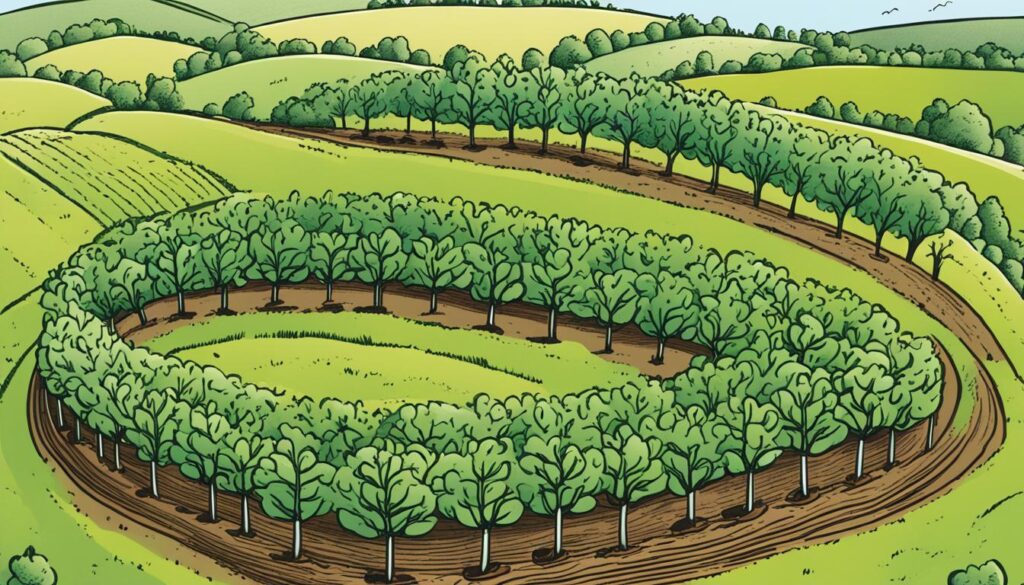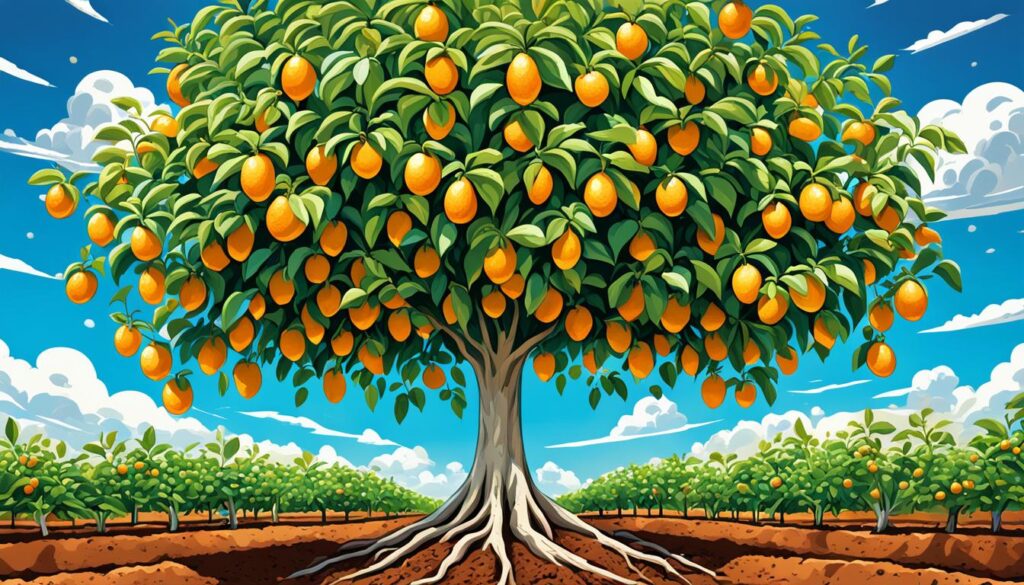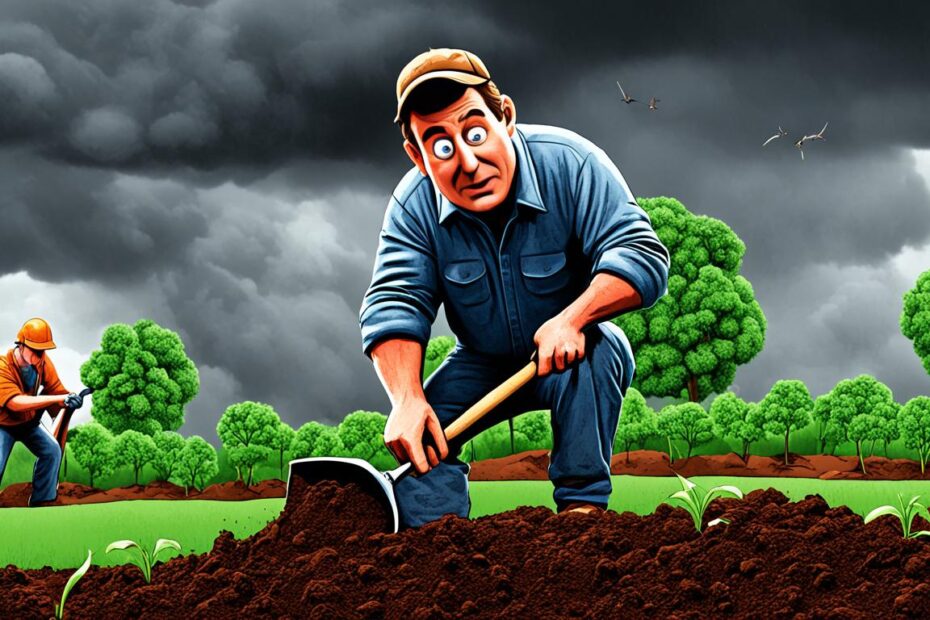Many gardeners dream of having a small backyard orchard with healthy fruit trees producing a good harvest year after year. If you have clay soil, however, that dream may seem unlikely to become a reality since fruit trees favor lighter, drier soils than clay. But don’t worry, with the right tree cultivar and some soil and site preparation, you can still grow fruit trees in clay soil and create a thriving backyard orchard. In this guide, we will explore the steps to successfully plant and grow fruit trees in clay soil, as well as the best fruit tree varieties for clay soil conditions.
Key Takeaways:
- Clay soil poses challenges for growing fruit trees, but it is possible with the right techniques.
- Conduct a soil test to determine your soil type and make any necessary adjustments.
- Choose fruit tree varieties and rootstocks that are tolerant of clay soil conditions.
- Proper soil preparation, including drainage improvements and soil amendments, is crucial.
- Consider alternative planting methods like raised beds or container gardening for better control over soil conditions.
How Do You Know If You Have Clay Soil?
Before you start planting fruit trees, it’s crucial to determine the type of soil you have, especially if it’s clay soil. Clay soil can vary in composition, ranging from sandy clay to heavy clay. To accurately identify your soil type and its pH level, conducting a soil test is recommended.
Soil tests are the most reliable way to gather essential information about your soil. They can be easily conducted by collecting a soil sample from your garden and sending it to a local Extension agency for analysis. These tests provide valuable insights into nutrient content, harmful organisms, and most importantly, the type of soil you have.
Regular soil testing, once every few years, is highly recommended to monitor changes in your soil and make any necessary adjustments. With the results from the soil test, you can determine the best approach to planting fruit trees and ensure optimum growing conditions for a healthy and productive orchard.
“Soil tests are like a compass that guides you in the right direction, enabling you to make informed decisions about planting and optimizing your soil’s health.” – [source]
Will Apple Trees Grow in Clay Soil?
Apple trees possess incredible resilience, even in challenging conditions such as clay loam soil. With proper considerations and techniques, these trees can thrive and bear delicious fruits in your backyard. However, to ensure successful cultivation, it is crucial to address two key factors: soil drainage and cross-pollination.
First and foremost, adequate soil drainage is essential for apple trees to flourish in clay loam soil. This type of soil tends to have a high water-holding capacity, which can lead to poor drainage and create an unfavorable environment for the trees’ roots. To improve drainage, consider implementing the following practices:
- Planting apple trees on raised beds or mounds
- Amending the soil with organic matter, such as compost or well-rotted manure
- Installing drainage tiles or pipes to redirect excess water
By implementing these techniques, you can enhance soil drainage, creating a healthier growing environment for your apple trees.
Secondly, it is important to understand that most apple tree varieties are not self-fruitful, meaning they require cross-pollination from another compatible apple tree to produce an abundant harvest. Therefore, planting multiple apple tree varieties is necessary to ensure successful cross-pollination and fruit set. Consider selecting apple tree varieties that flower at the same time to maximize the chances of cross-pollination.
Did you know? Apple trees can be cross-pollinated with the help of bees and other pollinators that transfer pollen from one tree to another. This natural process plays a vital role in fruit production and ensures a bountiful harvest.
When choosing apple tree varieties for clay loam soil, it is also worth considering the use of specific rootstocks that are well-suited for these conditions. Poland 18 (P.18) rootstock, for example, is known for its tolerance to wet soils and resistance to common apple tree problems. Incorporating such rootstocks can provide additional benefits and improve the overall health and productivity of your apple trees.
To summarize, growing apple trees in clay loam soil is not only possible but can also be highly rewarding. By addressing soil drainage, planting multiple compatible varieties, and selecting suitable rootstocks, you can create an optimal environment for your apple trees to thrive and produce an abundant harvest for years to come.

| Key Considerations for Growing Apple Trees in Clay Soil | Benefits |
|---|---|
| Improve soil drainage |
|
| Plant multiple compatible varieties |
|
| Utilize clay-tolerant rootstocks |
|
Will Cherry and Other Stone Fruit Trees Grow in Clay Soil?
Sweet cherry trees are not well-suited to clay soils due to their intolerance to these heavy conditions. However, there is still potential for growing stone fruit trees in clay soil with the right selection of cultivars and rootstocks. Tart cherry trees, for example, can tolerate clay or other heavy soils when grafted onto the Mazzard rootstock. This rootstock is known for its fibrous root system, which adapts well to heavy soils. By grafting tart cherry varieties onto the Mazzard rootstock, you can create a successful combination that thrives in clay soil.
While sweet cherry trees may not be suitable for clay soils, other stone fruit trees like peaches, nectarines, and apricots also face challenges due to their susceptibility to soil-borne diseases in such conditions. That said, there are specific rootstocks that have shown tolerance for high soil moisture and heavy soils, making them suitable options. Some of these rootstocks include Krymsk® 86, Viking, Rootpac® R, and Lovell. Consulting with a local expert and conducting a soil test will provide valuable insights and help you select the most appropriate rootstock for your needs.
Benefits of Mazzard Rootstock
The Mazzard rootstock offers a fibrous root system that adapts well to heavy soils, making it a viable choice for stone fruit trees in clay soil.
| Rootstock | Tolerance for High Soil Moisture and Heavy Soils |
|---|---|
| Krymsk® 86 | Yes |
| Viking | Yes |
| Rootpac® R | Yes |
| Lovell | Yes |
By considering the unique characteristics and requirements of stone fruit trees, along with the benefits of specific rootstocks like Mazzard and others, you can successfully cultivate a diverse orchard in clay soil. The key is to prioritize the selection of appropriate rootstocks based on their tolerance for high soil moisture and susceptibility to soil-borne diseases. With the right choices and careful attention to soil management, you can enjoy the beauty and bounty of stone fruit trees even in clay soil conditions.
Will Citrus and Avocado Trees Grow in Clay Soil?
Citrus and avocado trees are not well-adapted to clay soils because they require excellent drainage. However, with proper modifications to the soil, it may be possible to grow these trees.
Sour Orange and Trifoliate Orange rootstocks are known to tolerate wet, clay soils and can be used for citrus trees.
As for avocados, the research on rootstocks’ tolerance to wet soils is limited, but selecting a rootstock tolerant to salt may be beneficial.
It is important to consider the climate conditions and seek guidance from local experts for successful cultivation of citrus and avocado trees in clay soil.

| Citrus Trees | Avocado Trees |
|---|---|
| Sour Orange and Trifoliate Orange rootstocks tolerate wet, clay soils | Research on rootstocks’ tolerance to wet soils is limited |
| Excellent drainage is required | Select rootstock tolerant to salt |
| Consult with local experts for guidance | Consider climate conditions |
How to Work with Clay Soil
Improving Drainage and Creating a Suitable Environment
Working with clay soil can be challenging, but with the right techniques, you can improve drainage and create a suitable environment for fruit trees to thrive. Here are three recommended solutions for planting fruit trees in clay soil:
- Raised Beds: One effective way to work with clay soil is by using raised beds. Raised beds allow you to create a controlled environment with well-drained soil for your fruit trees. By elevating the planting area, water is less likely to accumulate, reducing the risk of waterlogged roots. Additionally, raised beds provide easier access for planting, pruning, and harvesting.
- Container Gardening: Another option for growing fruit trees in clay soil is container gardening. By planting your fruit trees in containers, you have complete control over the soil composition and drainage. Choose large enough containers to accommodate the root system and ensure proper drainage. Container gardening also allows for flexibility in terms of location, as you can move the containers to optimize sunlight and temperature conditions.
- Soil Amendments: Amending the clay soil with organic matter can significantly improve its structure and drainage. Incorporating compost, well-rotted manure, or peat moss into the soil helps loosen it up and increase its water-holding capacity. Organic matter also provides essential nutrients for the fruit trees. Before planting, thoroughly mix the amendments into the soil to ensure an even distribution.
By implementing these solutions, you can overcome the challenges posed by clay soil and create an environment where fruit trees can thrive. Remember to choose the appropriate solution based on your preferences, available space, and the specific needs of your fruit tree varieties.
“Working with clay soil requires some extra effort, but the satisfaction of seeing your fruit trees grow and flourish makes it all worthwhile. With raised beds, container gardening, and soil amendments, you can transform your clay soil into a fertile and accommodating home for your fruit trees.”
Conclusion
Planting fruit trees in clay soil may present some challenges, but with the right approach, you can still achieve a thriving orchard in your backyard. Understanding your soil type and conducting soil tests to determine its composition and pH level are crucial steps in successful fruit tree cultivation. Additionally, selecting clay-tolerant rootstocks is essential for the long-term health and productivity of your fruit trees.
Whether you choose to create raised beds, implement container gardening, or incorporate soil amendments, proper care and maintenance are key to ensuring the success of your fruit trees in clay soil. Regular watering, mulching, and monitoring for pests and diseases will contribute to the overall health and vitality of your trees.
Remember, patience is key when growing fruit trees in clay soil. It may take some time for your trees to establish themselves and adapt to their growing conditions. But with perseverance and attention to soil and tree health, you can create a flourishing orchard that will reward you with delicious fruits for years to come. So don’t be discouraged by clay soil, embrace the challenge, and get ready to enjoy the fruits of your labor!
FAQ
How do I determine if I have clay soil?
The most accurate way to determine the type of soil you have is by conducting a soil test. Your local Extension agency can provide instructions on gathering a soil sample for analysis.
Will apple trees grow in clay soil?
Yes, apple trees can thrive in clay loam soil as long as the soil has good drainage and a pH level between 5.5 and 7.5. Planting multiple apple trees for cross-pollination is necessary for a successful harvest.
Will cherry and other stone fruit trees grow in clay soil?
Tart cherry trees can tolerate clay or other heavy soils when grafted onto the Mazzard rootstock. However, peaches, nectarines, and apricots are generally not suitable for clay soils.
Will citrus and avocado trees grow in clay soil?
Citrus and avocado trees are not well-adapted to clay soils due to their need for excellent drainage. With proper modifications to the soil, it may be possible to grow these trees.
How can I work with clay soil?
Working with clay soil requires special considerations such as raised beds, container gardening, and incorporating soil amendments to improve drainage and provide a suitable environment for fruit trees.
